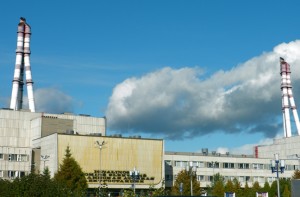
The Ignalina Nuclear Power Plant's design was too similar to Chernobyl for the European Union to stomach, so it's closure was one of the conditions of Lithuania's EU accession in 2004. Photo by Marius Davainis.
VILNIUS — A last-ditch effort to keep the Ignalina Nuclear Power Plant operating past it’s European Union-mandated shutoff date failed Thursday in the Lithuanian parliament.
The Seimas spent more than two hours Thursday voting four times on the same issue, even though the latter two were already invalid beforehand. None of the votes passed.
The vote, on whether or not to extend the operation of Ignalina by two years despite the EU stipulation not to, was first proposed by Mantas Varaška of the United Lithuania Party, one of the National Resurrection splinter groups. It was twice voted down that morning.
But supporters just wouldn’t give up, and Valentinas Mazuronis of the Social Democratic Party brought up a similar proposal that afternoon proposal. Most coalition members left the chamber in protest against what they considered a meaningless vote. Their absence meant that the minimum amount of people needed for the vote’s result to count — 71, or half of the parliament — was not present.
Despite this the opposition conducted two more votes by themselves, a process that lasted through the lunch break and into the early afternoon, a Seimas spokesman told Baltic Reports.
Following the exit of the ruling coalition, just 63 members of parliament were present, eight short of the minimum amount needed for a valid vote.
Speaker of the Seimas Irena Degutienė’s office told Baltic Reports that the speaker has no comment on the issue.
The quadruple vote comes at a time when the country is suffering its worst-ever recession and the budget is being considered for next year.
Parliamentarians voted on whether they should officially approach the EU over extending the deadline for the closure of Ignalina.
Impeached president and now member of European parliament Rolandas Paksas recently petitioned Brussels saying the country is stuck in a difficult situation.
Shutting down the power plant poses many unanswerable questions for Lithuania, the most pressing being energy independence and where to store the fuel for the plant. After decommissioning the plant, the radioactive fuel will need to be stored in a facility that isn’t ready and cannot be paid for by the government in any case.
To avoid these hassles, part of the Seimas wants to keep the plant open for another two years. The vote to decide whether or not to approach the EU comes virtually on the eve of the shutdown of the plant, which must be completed by Jan. 1, 2010. Lithuania has known that they would have to shut down the plant since joining the EU in 2004, but a nuclear power plant to replace Ignalina could be at least a decade away.
Shutting down the plant will leave Lithuanians with higher energy bills as other electricity sources are used. The country will buy 10 percent of its energy from Estonia next year and import 20 percent from other foreign markets.












